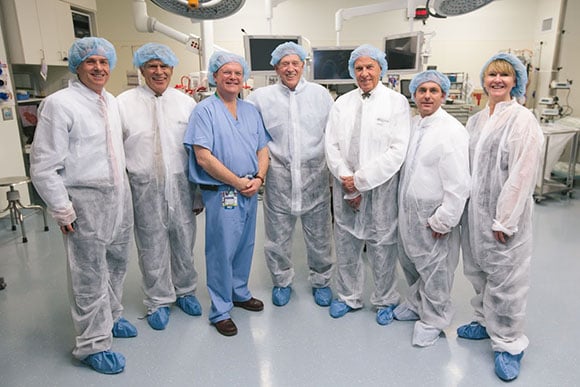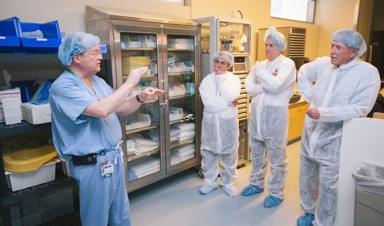The University of Colorado Board of Regents capped off a retreat on the Anschutz Medical Campus with a tour of the Colorado Fetal Care Center (CFCC) at Children’s Hospital Colorado. The CFCC, a collaboration between Children’s Hospital Colorado, University of Colorado Hospital and the University of Colorado School of Medicine, is one of the leading fetal clinical practice groups in the U.S.
 Following a retreat at AMC, regents donned clean room suits or "bunny suits" to tour the CFCC. Left to right: Michael Carrigan, AMC Chancellor Don Elliman, Dr. Timothy Crombleholme, Steve Bosley, CU president Bruce Benson, Kyle Hybl and Sue Sharkey
Following a retreat at AMC, regents donned clean room suits or "bunny suits" to tour the CFCC. Left to right: Michael Carrigan, AMC Chancellor Don Elliman, Dr. Timothy Crombleholme, Steve Bosley, CU president Bruce Benson, Kyle Hybl and Sue Sharkey
“The collaborations that we see between the medical school, Children’s, and University of Colorado Hospital are truly exceptional,” said Kyle Hybl, chairman of the University of Colorado Board of Regents. “Personally I feel privileged to play a small role in that.”
Fetal medicine focuses on the assessment, growth and health of the fetus, as well as the diagnosis of any fetal illnesses and abnormalities. The CFCC is staffed to handle open fetal surgery, fetoscopic guided surgery, ultrasound-guided interventions, simple shunts, radio frequency inflation and other procedures. The center’s expertise in these procedures, and ability to treat conditions such as twin-to-twin transfusion syndrome, congenital diaphragmatic hernias (CDH) and bladder outlet obstructions, causes patients from 48 states and worldwide to seek treatment.
 Crombleholme outlines conditions treated at the Colorado Fetal Care Center for regents.
Crombleholme outlines conditions treated at the Colorado Fetal Care Center for regents.
“We do every form of fetal intervention that is available anywhere in the world,” said Dr. Timothy Crombleholme, director of the CFCC and professor in the School of Medicine. “The kind of interventions that we can do here offer new options for babies who in the past wouldn’t survive.”
During the tour, Crombleholme highlighted an operating room referred to as a “double-wide.” The room is larger than a typical operating room to accommodate care teams and equipment for both mother and baby. Often procedures see 45 caregivers on-hand, with mother and child each having dedicated anesthesia, surgery and care teams—a measure to help improve the procedure outcomes.
Regents were also impressed with the turnaround time from initial referral.
Within 24 hours of being referred, patients are able to receive an ultra sound, echocardiogram, MRI, a caregiver team meeting, be screened by social worker, meet with nurses, have their medical history checked, as well as a physical, bloodwork, and consent meeting. Surgery is often scheduled for immediately after. According to Crombleholme, the ability to respond so quickly is crucial given the severity of some of the conditions for which patients are seeking treatment.
“It was an inspirational tour, said Michael Carrigan, Board of Regents member. “It was a wonderful reminder of all of the great work CU can do with their healthcare partners.”
